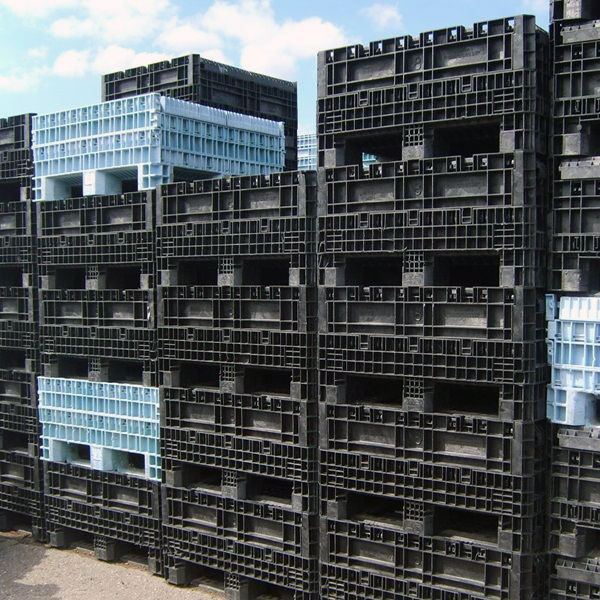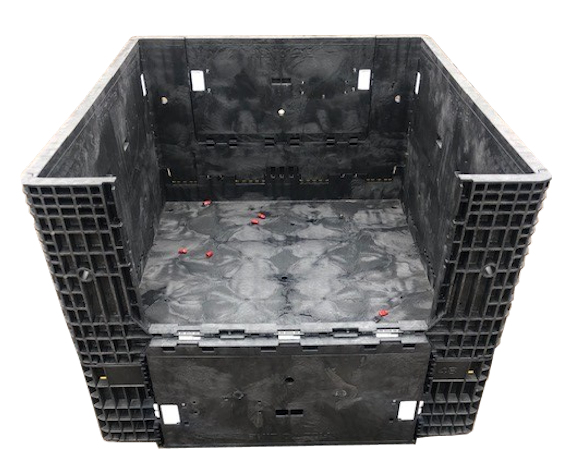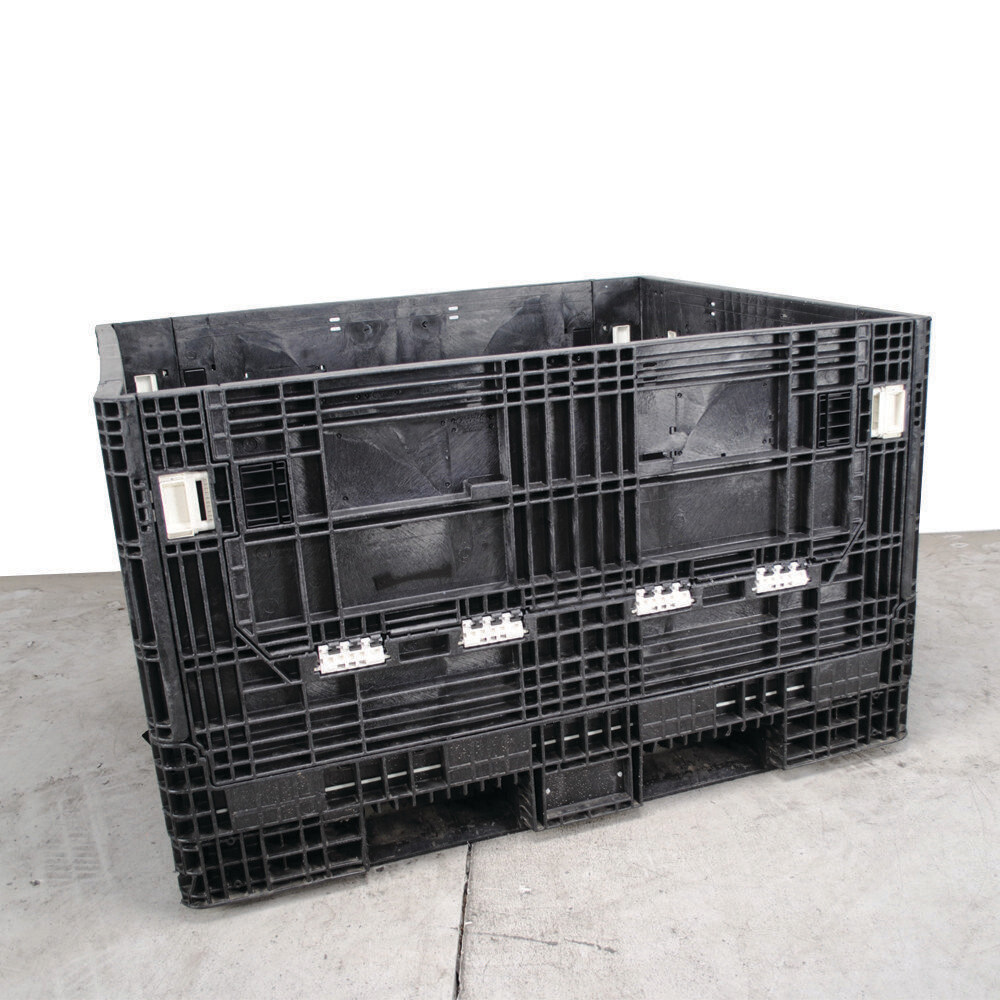Why Bulk Containers Are Essential for Sustainable and Cost-Effective Transport
Mass containers play a vital duty in contemporary logistics. They assist in the reliable activity of huge quantities of goods, thus enhancing transport processes. This technique not just minimizes expenses yet likewise decreases ecological effect via reduced exhausts and waste generation. As sectors seek even more lasting methods, the adoption of mass containers is coming to be significantly considerable. What implications does this change hold for future logistics and supply chain management?

The Benefits of Utilizing Bulk Containers in Logistics
Mass containers reinvent logistics by boosting efficiency and sustainability. These containers enable for the transportation of big quantities of items in a solitary trip, considerably reducing the variety of journeys required. This not just enhances procedures yet also decreases labor expenses connected with handling, filling, and unloading. In addition, bulk containers are made to maximize room utilization within transport vehicles, making sure that even more items can be delivered concurrently.
The standardization of mass containers also simplifies the logistics process. With consistent measurements, they can be quickly piled and stored, leading to improved warehouse administration. Furthermore, mass containers often feature durable materials that protect materials from damage during transportation, therefore lowering item loss and boosting overall reliability. Therefore, services can experience improved supply chain efficiency, eventually bring about increased earnings and customer complete satisfaction. This combination of variables makes mass containers an essential asset in modern logistics.
Environmental Effect: Lowering Waste and Carbon Impact
As sectors significantly prioritize sustainability, the fostering of mass containers has emerged as an essential technique for reducing waste and decreasing carbon impacts. These containers minimize using packaging materials, such as boxes and plastic, thereby notably decreasing total waste generation. By combining deliveries, bulk containers boost transportation effectiveness, permitting even more items to be transferred per journey. This reduction in trips straight associates with reduced greenhouse gas exhausts, adding to a smaller carbon footprint.
In addition, mass containers can typically be reused or recycled, further mitigating ecological impact. The resilience of these containers warranties they can withstand multiple transportation cycles, reducing the demand for single-use options. used collapsible bulk containers. By simplifying logistics and promoting reliable source use, bulk containers not just support lasting practices however likewise motivate industries to align with worldwide ecological goals. Inevitably, their implementation reflects a commitment to environmental stewardship and accountable resource management
Cost Savings: How Bulk Containers Lower Transport Expenditures
While many companies seek ways to improve their bottom line, the use of mass containers presents a substantial opportunity for lowering transportation costs. Mass containers optimize the quantity of goods moved, enabling organizations to ship larger quantities simultaneously. This performance lowers the number of journeys needed, straight lowering fuel costs and decreasing labor expenses connected with loading and dumping.
Additionally, bulk containers typically include structured styles that maximize room use within transportation lorries. This implies less voids, leading to more reliable use of available capability. Additionally, the sturdiness of bulk containers can decrease the danger of item damage throughout transportation, lowering losses and guaranteeing that even more items show up intact.
Enhancing Supply Chain Efficiency With Mass Storage Solutions
Bulk storage space remedies play a vital function in improving supply chain efficiency by enhancing inventory administration. By settling goods into fewer, bigger containers, services can substantially minimize managing prices related to regular transfers and processing. This structured strategy permits for much better tracking and management of supply, ultimately bring about improved operational efficiency.
Streamlined Stock Administration
Reliable supply monitoring is vital for optimizing supply chain operations, particularly when organizations take on bulk storage services. These remedies enable businesses to keep greater stock degrees while reducing the frequency of replenishment. By combining products right into mass containers, firms can simplify their supply procedures, reducing the complexity connected with tracking several smaller sized plans. This technique helps with accurate inventory counts and boosts forecasting accuracy, permitting for more informed decision-making. Furthermore, bulk storage remedies simplify storage facility company, making it simpler to locate and gain access to items when needed. Consequently, companies can attain a more effective stock turn over rate, inevitably improving total supply chain efficiency and lowering the likelihood of stockouts or overstock circumstances.

Minimized Handling Expenses
The application of mass storage space remedies not just enhances supply management yet likewise significantly reduces handling prices throughout the supply chain. By consolidating materials right into bulk containers, firms minimize the need for frequent handling and transfer in between various storage space and transport systems. This approach lowers labor expenses connected with loading, unloading, and moving smaller sized bundles. Furthermore, mass storage space decreases the frequency of deliveries, resulting in lower transportation costs and reduced fuel usage. Therefore, businesses can enhance their logistics procedures, permitting an extra efficient allowance of sources. Ultimately, lowered handling costs add to enhanced overall supply chain performance, fostering a setting that supports both sustainability and economic stability.

Flexibility of Bulk Containers Throughout Different Industries
Although several sectors have distinct demands for transportation and storage, mass containers have actually emerged as a functional option that meets a wide variety of requirements. These containers, varying from huge bins to specialized containers, can fit varied products, including liquids, granules, and powders. In the farming field, bulk containers assist in the transport of grains and plant foods, while the food and drink industry uses them for ingredients and finished items. The chemical industry relies upon bulk containers for safely transferring harmful products, ensuring conformity with safety and security policies. Additionally, building and construction firms take advantage of mass containers for moving accumulations and various other products. Their flexibility encompasses different settings of transportation, consisting of vehicles, ships, and trains, improving logistical effectiveness. This versatility not only simplifies procedures across different industries however additionally promotes sustainability by decreasing product packaging waste and enhancing space en route. Bulk containers play a necessary duty in modern supply chain monitoring.
Future Fads in Bulk Container Use and Sustainability
The future of mass container usage is significantly shaped by innovative materials growth that boosts sustainability. In addition, automation in logistics assures to simplify operations, minimizing waste and enhancing efficiency. Accepting round economic climate methods will certainly additionally transform just how bulk containers are developed, used, and recycled, cultivating a more sustainable transport landscape.
Ingenious Products Growth
As industries increasingly prioritize sustainability, cutting-edge materials development wholesale containers becomes a substantial aspect in boosting eco-friendly transportation services. Scientists and manufacturers are exploring eco-friendly plastics, recycled composites, and light-weight steels to reduce environmental influence. These materials not just decrease waste but likewise improve gas efficiency by decreasing the overall weight of containers. Furthermore, innovations in smart products, which can adjust to differing problems, enhance the longevity and functionality of bulk containers. The combination of these cutting-edge products straightens with round economy concepts, promoting reuse and recycling. As the demand for sustainable techniques expands, the growth of such materials will certainly play a crucial function fit the future of bulk container usage in logistics and transport.
Automation in Logistics
Considerable innovations in automation are poised to transform logistics and the application of bulk containers, improving sustainability in transportation. Automated systems, including drones and self-governing cars, are enhancing the motion of bulk containers, minimizing the reliance on standard fuel-powered transportation. These innovations maximize directing and loading procedures, boosting and reducing empty miles fuel effectiveness. In addition, automated inventory monitoring systems enhance tracking and surveillance of mass containers, ensuring much better source allotment and reduced waste. The assimilation of the Internet of Things (IoT) enables real-time information analysis, allowing proactive decision-making that straightens with sustainability goals. As automation remains to progress, it is anticipated to drive further innovations in bulk container use, ultimately supporting more sustainable logistics methods and decreasing the ecological effect of transport.
Circular Economic Situation Practices
Innovations in automation are establishing the phase for a much more integrated approach to round economic climate methods in the domain of bulk container usage. As industries progressively embrace sustainability, mass containers are being developed for durability and reusability. This change not just reduces waste however additionally enhances source effectiveness. Firms are embracing methods such as closed-loop systems, where made use of containers are gathered, reconditioned, and reintroduced right into the supply chain. Furthermore, clever modern technologies track container life process, assisting in better monitoring and decreasing ecological effect. The cooperation between makers, logistics providers, and end-users is crucial in establishing standards for sustainable container usage. used collapsible bulk containers. Future trends suggest a growing emphasis on materials that are eco-friendly and recyclable, further strengthening the round economic climate's principles in bulk transportation

Regularly Asked Questions
What Materials Are Mass Containers Generally Made From?
Bulk containers are typically built from resilient products such as high-density polyethylene, cardboard, steel, and aluminum. These products supply defense, flexibility, and toughness, making them appropriate for transporting various goods in various markets effectively.
How Do I Select the Right Dimension Mass Container?
Picking the appropriate dimension bulk container includes evaluating the volume of products to be transported, thinking about dealing with equipment compatibility, and appraising storage room demands. Correct size warranties effectiveness in transportation and decreases waste during shipment.
Are Mass Containers Reusable or Recyclable?
Bulk containers are usually multiple-use, created for multiple trips, improving sustainability. Many can also be recycled, relying on the materials used. Choosing recyclable choices additionally supports environmental goals and minimizes waste in transport practices.
What Safety And Security Regulations Put On Mass Container Transportation?
Safety regulations for bulk container transport include compliance with the Department of Transport guidelines, appropriate labeling of unsafe products, structural honesty evaluations, and adherence to weight limits to guarantee secure handling and prevent accidents during transportation.
Exactly How Can Companies Change to Utilizing Mass Containers Successfully?
Companies can transform to bulk containers by examining current logistics, educating team on handling, investing in ideal equipment, maximizing inventory administration, and teaming up with distributors to assure compatibility and effectiveness throughout the supply chain.
As markets progressively prioritize sustainability, the fostering of mass containers has arised as a vital technique for lowering waste more info and lowering carbon footprints. By settling materials right into bulk containers, business can streamline their inventory procedures, reducing the complexity connected with tracking numerous smaller sized packages. As markets increasingly focus on sustainability, ingenious products development in mass containers emerges as a substantial aspect in improving eco-friendly transportation services. Automated systems, consisting of drones and independent lorries, are streamlining the movement of bulk containers, minimizing the dependence on traditional fuel-powered transport. Additionally, automated inventory management systems improve tracking and monitoring of bulk containers, guaranteeing much better resource allowance and minimized waste.